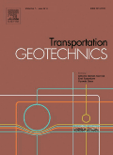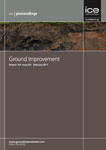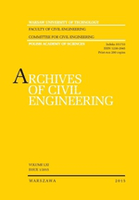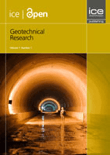
Transportation Geotechnics
Scope & Guideline
Elevating Standards in Transportation Infrastructure.
Introduction
Aims and Scopes
- Geotechnical Performance of Transportation Infrastructure:
The journal emphasizes research on the geotechnical aspects of roads, railways, and tunnels, including the analysis of soil behavior under various loading conditions, environmental factors, and construction methods. - Innovative Materials and Stabilization Techniques:
A significant focus is on developing and assessing new materials and stabilization methods for improving the performance of soil and aggregate materials used in transportation infrastructure. - Impact of Climate Change on Infrastructure:
Research addressing the effects of climate change on soil mechanics and infrastructure resilience is increasingly prominent, reflecting the need for sustainable practices in geotechnical engineering. - Machine Learning and Data-Driven Approaches:
The journal showcases advancements in machine learning applications for predicting soil behavior, material performance, and infrastructure monitoring, indicating a shift towards data-driven methodologies in geotechnical research. - Field Studies and Real-World Applications:
Field investigations and case studies are a crucial part of the journal, providing practical insights into the performance of transportation systems and informing future designs.
Trending and Emerging
- Sustainable and Green Engineering Solutions:
There is a growing emphasis on sustainable practices, including the use of recycled materials, biopolymers, and environmentally friendly stabilization techniques to enhance the resilience of transportation infrastructure. - Smart Technologies and Monitoring Systems:
The integration of smart technologies, including sensor systems and real-time monitoring of infrastructure performance, is a trending theme, highlighting the importance of data collection and analysis in modern geotechnics. - Climate Resilience and Adaptation Strategies:
Research focusing on the resilience of transportation infrastructure to climate change, including studies on frost heave, moisture variations, and extreme weather impacts, is increasingly prevalent. - Advanced Computational Methods and Simulations:
There is a significant rise in the use of advanced computational techniques, including finite element and discrete element modeling, to analyze complex interactions in geotechnical systems. - Machine Learning and Artificial Intelligence Applications:
The application of machine learning and artificial intelligence in predicting soil behavior, optimizing designs, and enhancing the performance of transportation systems is gaining momentum, reflecting the shift towards data-centric methodologies.
Declining or Waning
- Traditional Soil Mechanics:
Research focused solely on classical soil mechanics principles without integration into modern applications or innovations is becoming less frequent, as the field evolves to include more interdisciplinary approaches. - Static Analysis Methods:
There is a noticeable decrease in publications centered around static analysis methods for soil and structure interaction, as dynamic and time-dependent analyses gain more attention in the context of real-world applications. - Conventional Materials without Innovation:
Papers focusing on traditional materials without exploring innovative alternatives or enhancements are declining, reflecting a broader trend towards sustainability and material efficiency in geotechnics. - General Reviews without New Insights:
While review articles continue to be valuable, those that do not provide new insights or syntheses of the latest research findings are less common, as the journal increasingly prioritizes original contributions. - Localized Case Studies with Limited Applicability:
Case studies that do not offer broader implications or are not applicable to wider contexts are seeing reduced publication rates, as the focus shifts towards more universally relevant research.
Similar Journals

CANADIAN JOURNAL OF CIVIL ENGINEERING
Building the Future Through Research and DevelopmentCanadian Journal of Civil Engineering, published by Canadian Science Publishing, serves as a premier platform for the dissemination of innovative research and development in the fields of civil and structural engineering, as well as environmental science. Established in 1971, this journal maintains a robust reputation, achieving a Q3 ranking in both civil engineering and general environmental science categories as of 2023. While it does not currently offer open access, the journal is accessible to a wide audience of researchers, professionals, and students who are keen to stay abreast of the latest advancements in civil engineering practices. With a significant number of yearly publications and a committed editorial board, the Canadian Journal of Civil Engineering contributes to the foundational knowledge and practical applications in the engineering community, thereby playing a critical role in addressing contemporary challenges in civil infrastructure and environmental sustainability.

Proceedings of the Institution of Civil Engineers-Ground Improvement
Driving Research for Sustainable Building PracticesProceedings of the Institution of Civil Engineers-Ground Improvement is a distinguished journal published by EMERALD GROUP PUBLISHING LTD, dedicated to advancing knowledge and research in the fields of Building and Construction, Geotechnical Engineering, Mechanics of Materials, and Soil Science. With an ISSN of 1755-0750 and an E-ISSN of 1755-0769, this journal has been a vital platform for disseminating innovative research since its inception in 2008. With an impact factor placing it in the Q3 category across multiple engineering disciplines, it ranks favorably in Scopus, ensuring visibility and recognition among scholars globally. The journal offers open access options, allowing for broader dissemination of research findings. Targeting researchers, professionals, and students alike, it aims to foster discussions on ground improvement technologies and methodologies that are essential for sustainable infrastructure development. As it continues to converge its focus until 2024, the Proceedings stands as an imperative resource for those seeking to elevate their understanding and contribute to the ever-evolving field of civil engineering.

Acta Geotechnica
Charting New Frontiers in Geotechnical EngineeringActa Geotechnica, published by SPRINGER HEIDELBERG, is a leading journal in the field of earth sciences and geotechnical engineering, renowned for its rigorous peer-review process and innovative research contributions. With an impressive impact factor and a notable position in the 2023 Category Quartiles as Q1 in both Earth and Planetary Sciences (miscellaneous) and Geotechnical Engineering and Engineering Geology, this journal is pivotal for professionals and academics alike, providing insights that push the boundaries of geotechnical research. The journal features a diverse range of articles, spanning from foundational studies to the latest advancements in sustainable geotechnical practices, making it an essential resource for researchers, practitioners, and students committed to understanding and solving complex geological challenges. The Scopus ranks further affirm its influence, placing it in the 95th and 92nd percentiles of its categories. With no open access options as of now, subscribers gain exclusive access to trailblazing studies aimed at enhancing geotechnical understanding and application globally.

Archives of Civil Engineering
Pioneering Open Access in Civil Engineering ScholarshipArchives of Civil Engineering is a premier academic journal published by POLISH ACAD SCIENCES, dedicated to advancing the field of civil and structural engineering. Established in 1996, this open-access journal has been pivotal in disseminating high-quality research and innovation in engineering practices, particularly since adopting open access in 2010. With an ISSN of 1230-2945 and E-ISSN of 2300-3103, it enjoys a notable reputation, currently ranked in Q3 of the Civil and Structural Engineering category for 2023, reflecting its considerable contribution to scholarly content in the discipline. The journal caters to a diverse audience of researchers, professionals, and students, providing them with a platform to share and access essential findings. Its commitment to high academic standards is underscored by its ranking in Scopus, where it stands at Rank #265/379. Located in Warsaw, Poland, the journal aims to promote international collaboration and foster knowledge exchange in civil engineering, making it an indispensable resource for anyone involved in this dynamic field.

KSCE Journal of Civil Engineering
Fostering Global Collaboration in Engineering InnovationKSCE Journal of Civil Engineering is a prestigious international publication dedicated to advancing the field of civil engineering. Established by the Korean Society of Civil Engineers (KSCE), this journal serves as a vital platform for high-quality research in the discipline, showcasing innovative methodologies, case studies, and critical analyses pertinent to civil and structural engineering. With an impact factor placing it in the Q2 category of civil engineering journals for 2023 and a solid Scopus rank of #141 out of 379, it reflects the significant contributions of its authors and the growing recognition of its published works. KSCE Journal of Civil Engineering, based in Germany and easily accessible to the global research community, is committed to disseminating knowledge with rigor and integrity, encouraging both emerging scholars and seasoned experts to contribute to the evolving discourse in civil engineering. With a convergence period from 2009 to 2024, the journal continues to uphold its mission of fostering innovation and excellence in engineering practice.

Geotechnical Engineering
Elevating Practices through Rigorous ScholarshipGeotechnical Engineering, published by the Southeast Asian Geotechnical Society, is a prominent journal dedicated to the field of geotechnical and civil engineering. With its ISSN of 0046-5828, this journal serves as a vital platform for researchers and practitioners to disseminate innovative findings and explore new methodologies within the discipline. Although currently listed in the Q4 quartile across both Civil and Structural Engineering and Geotechnical Engineering categories, Geotechnical Engineering is committed to fostering rigorous scholarship and community engagement in the dynamic field of geotechnical sciences. The journal covers a wide range of topics, providing an important resource for the engineering community. While it does not offer open access, it facilitates significant contributions that enhance the understanding and practice of geotechnical engineering in Southeast Asia and beyond, underscoring its vital role as a knowledge hub for researchers, professionals, and students alike.

Journal of the Korean Geosynthetic Society
Fostering Collaboration in Geosynthetic Science and PracticeJournal of the Korean Geosynthetic Society, published by the Korean Geosynthetic Society, is an essential platform dedicated to advancing the field of geosynthetics, a critical area of civil engineering and environmental science. With a focus on innovative materials and applications that contribute to sustainable infrastructure and environmental protection, this journal actively encourages submissions from researchers and practitioners worldwide. Although currently not indexed by Impact Factor systems, the journal's commitment to rigorous peer-review ensures the dissemination of high-quality research and practical insights that drive the field forward. The journal publishes a range of articles including experimental studies, theoretical analyses, and case studies, making it a valuable resource for engineers, researchers, and students alike, fostering collaboration and knowledge sharing within the geosynthetic community. The journal is accessible at http://www.kgs.org. Join us in shaping the future of geosynthetic technology through your contributions!

CANADIAN GEOTECHNICAL JOURNAL
Exploring Innovative Solutions in GeotechnicsCanadian Geotechnical Journal, published by Canadian Science Publishing, stands as a premier resource in the field of geotechnical engineering, focusing on the science and practice of soil mechanics, engineering geology, and related disciplines. Established in 1968, this esteemed journal has earned a distinguished reputation, holding a Q1 ranking in both Civil and Structural Engineering as well as Geotechnical Engineering and Engineering Geology as of 2023. It features a rigorous peer-review process that ensures the publication of high-quality research, making it essential reading for researchers, professionals, and students alike. With an impressive Scopus rank of #63 out of 379 in Civil and Structural Engineering and #41 out of 229 in Geotechnical Engineering, the journal continues to contribute significantly to the advancement of knowledge in geotechnics. While the journal does not currently provide open access options, it remains a vital platform for disseminating innovative findings and fostering academic collaboration in the geotechnical community.

Geotechnical Research
Advancing geotechnical knowledge for a sustainable future.Geotechnical Research is an esteemed scholarly journal published by EMERALD GROUP PUBLISHING LTD, dedicated to advancing the field of geotechnical engineering and earth sciences. With an impact factor reflective of its robust contributions, this open access journal has been providing unrestricted access to high-quality research since 2014, making it indispensable for researchers, professionals, and students alike. The journal, indexed under the ISSN 2052-6156, features rigorous peer-reviewed articles that encompass a wide range of topics within geotechnical engineering and engineering geology, achieving a notable placement in the Q2 category in both Earth and Planetary Sciences and Geotechnical Engineering as of 2023. With its Scopus ranks further affirming its significance—ranked #44 out of 159 in Earth and Planetary Sciences and #78 out of 229 in Geotechnical Engineering—Geotechnical Research stands as a vital resource for innovative solutions and advancements in this critical field, ensuring researchers access to essential insights that drive the discipline forward.

Transportation Infrastructure Geotechnology
Advancing the Future of Transportation Infrastructure.Transportation Infrastructure Geotechnology, an esteemed journal published by SpringerNature, serves as a vital platform in the fields of Civil and Structural Engineering, Environmental Engineering, Geotechnical Engineering, and Transportation. Established in 2014 and spanning a decade of significant scientific discourse, this journal has gained recognition for its robust contribution to the understanding of the interplay between geotechnical processes and transportation infrastructure. With an impactful Q2 ranking in multiple categories—including Civil and Structural Engineering and Environmental Engineering—it emphasizes innovative research and practical applications globally. Researchers and professionals can explore critical topics that influence infrastructure sustainability, safety, and efficiency. Although it operates under a subscription model, its affiliation with SpringerNature ensures rigorous peer-review and high-quality publications, making it an indispensable resource for academics and industry experts alike.